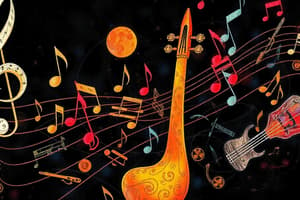Podcast
Questions and Answers
الموسيقى ليست مترابطة عميقاً مع الثقافة
الموسيقى ليست مترابطة عميقاً مع الثقافة
False (B)
الموسيقى تؤثر فقط على الجوانب الترفيهية في المجتمع
الموسيقى تؤثر فقط على الجوانب الترفيهية في المجتمع
False (B)
تطوّر تعريف الموسيقى عبر التاريخ بشكل ثابت ودائم
تطوّر تعريف الموسيقى عبر التاريخ بشكل ثابت ودائم
False (B)
الموسيقى لها تأثير سلبي فقط على التنمية البشرية والرفاهية
الموسيقى لها تأثير سلبي فقط على التنمية البشرية والرفاهية
الموسيقى لها القدرة على تعزيز التلاحم الاجتماعي
الموسيقى لها القدرة على تعزيز التلاحم الاجتماعي
Flashcards are hidden until you start studying
Study Notes
What is Music?
Music is an art form that involves the creation and arrangement of sounds for beauty, grace, and emotional expression. It is concerned with combining vocal and instrumental sounds to produce a cohesive piece of art. Throughout history, music has been present in every human society, and its styles and forms have evolved to accommodate various cultures and time periods.
Historical Conceptions of Music
The concept of music has been shaped by various historical accounts. In India, for example, music has been attributed to the power to move people and has been recognized for its ecstatic possibilities. In early Western and Eastern conceptions, music was seen as an integral part of human life, affecting emotions and serving as a means of communication and expression.
Elements of Music
Music is composed of several elements, including melody (the arrangement of single pitches in a song), harmony (the combination of multiple pitches sounding simultaneously), rhythm (the pattern of sound and silence over time), timbre (the sound's coloration or tone), and texture (the combination of sounds and their individual parts).
Musical Instruments
A wide range of musical instruments has been developed throughout history, including electronic instruments, keyboard instruments, percussion instruments, stringed instruments, and wind instruments. Each type of instrument contributes to the overall sound and can be used to create different musical styles.
Music and Culture
Music is deeply intertwined with culture, and its styles and forms often reflect the social, historical, and geographical contexts in which they were created. Different cultures have developed their unique musical traditions, such as folk music, classical music, jazz, rock, and electronic music.
Music in Society
Music has played a significant role in various aspects of society, including ritual and drama, as well as in more recent forms of entertainment like radio, film, television, musical theater, and the Internet. It has also been used in various fields, such as psychotherapy, geriatrics, and advertising, to influence human behavior.
The Evolution of Music
Throughout history, the definition of music has evolved, reflecting changes in technology, cultural norms, and artistic expression. In recent times, music has become more accessible and diverse, with the emergence of new genres and the democratization of music production.
The Impact of Music on Human Development and Well-Being
Research has shown that music can have a positive impact on human development and well-being, affecting both cognitive and emotional processes. Listening to music, playing instruments, and engaging in musical activities can enhance various aspects of human life, such as physical, social, educational, and psychological development.
Music and Social Cohesion
Music has the ability to bring people together and promote social cohesion. It can synchronize our bodies and brains, leading to increased coordination, a sense of belonging, and prosocial behavior. This synchronization effect is particularly strong in rhythmic music, which can facilitate cooperation and coordination among individuals.
Music and Communication
Music is a universal language that can convey emotions and ideas across cultures and languages. It has been used as a means of communication and expression since ancient times and continues to play an important role in contemporary society.
Music in Education
Music education has been shown to have numerous benefits, including cognitive and emotional development, social skills, and cultural awareness. The teaching of music in primary and secondary schools has become widely accepted, and music is often used as a tool for learning in other subjects as well.
Music and Mood Regulation
Music can have a significant impact on mood and emotional states, with different genres and styles affecting people in various ways. The choice of music can be a powerful tool for managing emotions and creating a desired atmosphere, whether in personal life or professional settings.
Conclusion
Music is a complex and multifaceted art form that has been an integral part of human life for centuries. It is a means of expression, communication, and emotional connection that has evolved to accommodate various cultures and time periods. Music has the power to move, inspire, and bring people together, and its impact on human development and well-being is well documented. As a form of art and a source of joy, music continues to be a vital part of our lives, shaping our culture and influencing our emotions in both subtle and profound ways.
Studying That Suits You
Use AI to generate personalized quizzes and flashcards to suit your learning preferences.




